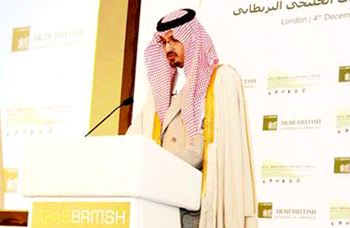 Jeddah, Dec 6: Saudi Arabia’s massive spending on infrastructure and overhaul of its regulatory environment has made the country even more attractive for foreign investors.
Jeddah, Dec 6: Saudi Arabia’s massive spending on infrastructure and overhaul of its regulatory environment has made the country even more attractive for foreign investors.
This is according to Prince Saud bin Khaled Al-Faisal, deputy governor of the Saudi Arabian General Investment Authority (SAGIA), who said that these developments have seen the Kingdom become one of the world’s leading economies.
He made the comments during a speech at the British-Gulf Economic Forum in London on Thursday, which was organized by the Arab-British Chamber of Commerce. Prince Albert and Abdullatif bin Rashid Al-Zayani, secretary-general of the GCC, also attended the event.
He praised Custodian of the Two Holy Mosques King Abdullah for allocating $76 billion (SR285.2 billion) in 2014 for infrastructure development, or about 11.1 percent of the Kingdom’s GDP.
He said infrastructure spending per capita is currently about $815 (SR3,059), which is more than double that of other emerging markets such as Brazil, India and Indonesia.
The Kingdom has also overtaken many developed countries in the global index of infrastructure investment in 2014, and is now in 11th place, while the United States is ranked 12th.
He pointed out that the country’s GDP over the past decade increased from $214 billion (SR803.2 billion) in 2004 to $750 billion (SR2.8 trillion) in 2013, which places the Kingdom in third place among the top 20 fastest growing economies.
He said the Kingdom is open to foreign investment and has introduced several laws and regulations to boost opportunities for investors, including reducing the investment capital required for foreign companies. He said the Kingdom has also enacted legislation to enhance commercial arbitration.
He said there were several investment opportunities in the Kingdom, and commended SAGIA’s efforts over the past few years in making the Kingdom an attractive place for investors.





Comments
Add new comment